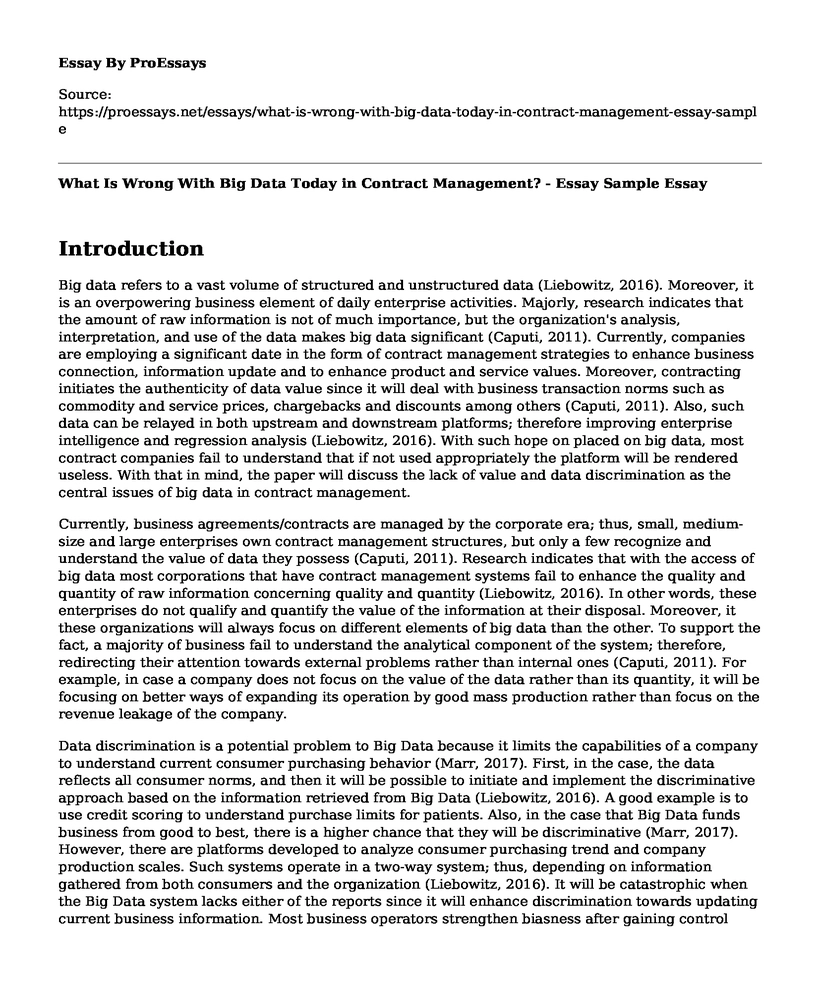Introduction
Big data refers to a vast volume of structured and unstructured data (Liebowitz, 2016). Moreover, it is an overpowering business element of daily enterprise activities. Majorly, research indicates that the amount of raw information is not of much importance, but the organization's analysis, interpretation, and use of the data makes big data significant (Caputi, 2011). Currently, companies are employing a significant date in the form of contract management strategies to enhance business connection, information update and to enhance product and service values. Moreover, contracting initiates the authenticity of data value since it will deal with business transaction norms such as commodity and service prices, chargebacks and discounts among others (Caputi, 2011). Also, such data can be relayed in both upstream and downstream platforms; therefore improving enterprise intelligence and regression analysis (Liebowitz, 2016). With such hope on placed on big data, most contract companies fail to understand that if not used appropriately the platform will be rendered useless. With that in mind, the paper will discuss the lack of value and data discrimination as the central issues of big data in contract management.
Currently, business agreements/contracts are managed by the corporate era; thus, small, medium-size and large enterprises own contract management structures, but only a few recognize and understand the value of data they possess (Caputi, 2011). Research indicates that with the access of big data most corporations that have contract management systems fail to enhance the quality and quantity of raw information concerning quality and quantity (Liebowitz, 2016). In other words, these enterprises do not qualify and quantify the value of the information at their disposal. Moreover, it these organizations will always focus on different elements of big data than the other. To support the fact, a majority of business fail to understand the analytical component of the system; therefore, redirecting their attention towards external problems rather than internal ones (Caputi, 2011). For example, in case a company does not focus on the value of the data rather than its quantity, it will be focusing on better ways of expanding its operation by good mass production rather than focus on the revenue leakage of the company.
Data discrimination is a potential problem to Big Data because it limits the capabilities of a company to understand current consumer purchasing behavior (Marr, 2017). First, in the case, the data reflects all consumer norms, and then it will be possible to initiate and implement the discriminative approach based on the information retrieved from Big Data (Liebowitz, 2016). A good example is to use credit scoring to understand purchase limits for patients. Also, in the case that Big Data funds business from good to best, there is a higher chance that they will be discriminative (Marr, 2017). However, there are platforms developed to analyze consumer purchasing trend and company production scales. Such systems operate in a two-way system; thus, depending on information gathered from both consumers and the organization (Liebowitz, 2016). It will be catastrophic when the Big Data system lacks either of the reports since it will enhance discrimination towards updating current business information. Most business operators strengthen biasness after gaining control over a robust set of consumers.
Conclusion
To conclude Big Data acts as a pillar towards empowering businesses. Besides, enhances product and service value, but since most corporations are not familiar with the systems, they lack the technical skills to understand the hidden value in the data. Unknown value minimises company production and product and service value; thus, a problem for management. Also, it enhances data discrimination since well-established companies will lose focus on various categories of consumers. Finally, it this case discrimination is in the form of financial capabilities.
References
Caputi, M. (2011, June 25). Contracts Management and Analytics: The Source of Truth for Big Data. Retrieved September 5, 2018, from The DELLEMC Corporation Website: https://infocus.dellemc.com/mauro_caputi/contracts-management-and-analytics-the-source-of-truth-for-big-data/Liebowitz, J. (2016). Big Data and Business Analytics. CRC Press.
Marr, B. (2017, June 15). 3 Massive Big Data Problems Everyone Should Know About. Retrieved September 5, 2018, from The Forbes Corporation Website: https://www.forbes.com/sites/bernardmarr/2017/06/15/3-massive-big-data-problems-everyone-should-know-about/#5000bd961862
Cite this page
What Is Wrong With Big Data Today in Contract Management? - Essay Sample. (2022, Jul 27). Retrieved from https://proessays.net/essays/what-is-wrong-with-big-data-today-in-contract-management-essay-sample
If you are the original author of this essay and no longer wish to have it published on the ProEssays website, please click below to request its removal:
- Organizational Change Management Paper Example
- International Business Perspective Essay
- Decision Making in a Business: The Sneaker Market in the United States Paper Example
- Teamwork Development Paper Example
- A Budgeting Crisis at Little State University: Case Study
- Research Paper on Counterintelligence: Preventing Sabotage and Protecting Data
- Essay Example on Developing a Diversity Training Plan: Strategies and Implementation







